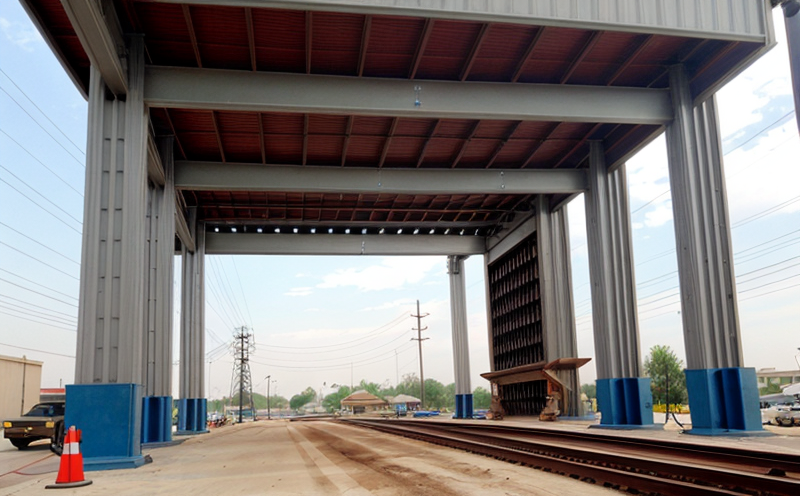ASTM D6482 Open Hole Tensile Testing of Laminates
The ASTM D6482 standard specifies a method for open hole tensile testing of laminates, which is critical in aerospace and aviation applications. This test evaluates the structural integrity and mechanical properties of composite materials under specific loading conditions. The purpose of this testing ensures that aircraft components meet stringent safety standards set by regulatory bodies.
The primary focus on open holes arises from the fact that many aerospace structures may contain openings, such as those found in wing sections or fuselage parts where rivets or fasteners are present. These features create regions of stress concentration that can lead to early fatigue failure if not adequately tested and designed.
Testing according to ASTM D6482 involves subjecting a composite laminate sample with an intentional open hole defect under tensile loading until it fractures. The test setup typically includes specialized fixtures capable of applying controlled forces while maintaining precise alignment between the specimen and the loading mechanism. Specimens used for this test are usually prepared by drilling holes into standard specimens according to predefined dimensions.
The data collected from these tests provides critical information about how materials behave under real-world conditions, particularly focusing on their ability to resist stresses around openings. This knowledge helps engineers optimize design parameters such as thicknesses and fiber orientations within composite structures, thereby enhancing overall safety margins without compromising weight efficiency.
Compliance with ASTM D6482 is essential for manufacturers who wish to ensure their products meet industry standards for structural integrity. By performing these tests accurately, companies can demonstrate adherence to international norms like those outlined in ISO and AS/NAS specifications relevant to aerospace manufacturing.
In summary, the ASTM D6482 open hole tensile testing process plays a vital role in ensuring the reliability of composite materials used in critical aviation components. It enables manufacturers to identify potential weaknesses early on during product development stages, allowing them to make necessary adjustments before production begins. As such, this service contributes significantly towards maintaining high quality standards across the entire supply chain involved in aerospace manufacturing processes.
Why It Matters
The importance of ASTM D6482 testing cannot be overstated when considering its implications for safety and performance in aviation. Properly conducted, this test helps manufacturers identify any flaws or weaknesses within composite materials before they reach end users. This proactive approach ensures that any issues are addressed during the design phase rather than after product deployment.
From a broader perspective, compliance with such standards fosters trust among stakeholders – including customers and regulatory authorities alike – knowing that products adhere to internationally recognized best practices. Moreover, successful completion of these tests can open doors for new business opportunities by establishing credibility within competitive markets.
Additionally, accurate ASTM D6482 testing supports continuous improvement efforts aimed at enhancing product quality over time. By regularly validating results against established benchmarks, organizations can refine their processes and technologies to stay ahead in an ever-evolving industry landscape.
Customer Impact and Satisfaction
Customers benefit greatly from rigorous ASTM D6482 testing as it translates into safer products with enhanced durability. When manufacturers invest in thorough quality assurance measures like this, they demonstrate a commitment to delivering reliable performance across all lifecycle stages of the product.
For procurement departments within organizations, having access to comprehensive test results allows them to make informed decisions regarding material selection and supplier evaluation. Knowing that suppliers have undergone stringent testing processes increases confidence in long-term partnerships while reducing risks associated with subpar quality.
R&D teams also reap significant advantages from ASTM D6482 testing as it provides valuable insights into the behavior of different composite materials under various loading conditions. These findings can guide future innovations, leading to more advanced designs that meet increasingly stringent performance requirements.
Competitive Advantage and Market Impact
In today’s highly competitive aerospace market, maintaining compliance with standards like ASTM D6482 offers significant advantages. It sets a benchmark for excellence that competitors strive to achieve but may struggle to replicate due to the specialized equipment required or expertise needed.
Organizations that consistently perform these tests not only enhance their reputation as leaders in quality control but also gain competitive edge by being able to offer products with superior safety and performance characteristics. This can translate into increased market share and higher customer satisfaction rates.
The ability to demonstrate compliance with international standards like ASTM D6482 opens doors for international collaborations and partnerships, further expanding business horizons. Such recognition also enhances brand image, making it easier to attract top talent and establish long-term relationships within the industry ecosystem.





